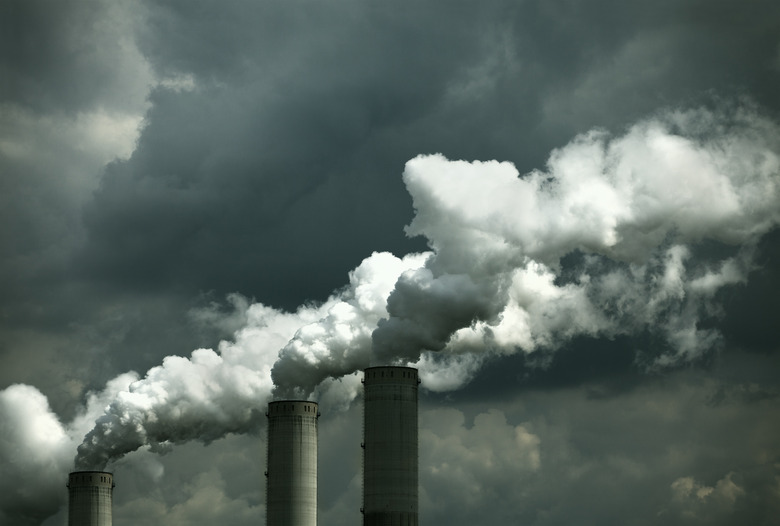What Damages An Ecosystem?
Ecosystems throughout the world are endangered. Damaged ecosystems occur when species within the system are lost, habitat is destroyed and/or the food web is affected. Because all species live in complex interdependent systems with interdependent relationships, the loss or change of any single species or abiotic factors has negative consequences on others within the ecosystem.
Pollution, over-exploitation, climate change and invasive species pose particular threats to the world's ecosystems, biodiversity and ecological integrity.
Ecosystem Definition
Ecosystem Definition
An ecosystem is defined by all of the interactions between living and nonliving factors, which are known as biotic and abiotic factors. This includes interactions between populations of organisms, between organisms within the same population and between organisms and their environment.
Both biotic and abiotic factors can lead to a damaged ecosystem.
Pollution
Pollution
Industrial and agricultural pollution is prevalent throughout the world with man-made chemicals found in virtually all environmental niches.
Some ecosystem examples with pollution damage are right in the US. In the United States, pollution from mining contaminates 40 percent of western rivers, poisoning aquatic life and bioaccumulating in the food chain. Many chemical pollutants, including pesticides and plastics, disrupt animal hormonal activity and reproduction, reducing biodiversity in water and on land.
Organic nutrients from agricultural runoff result in aquatic algae blooms that deplete dissolved oxygen levels, creating dead zones in coastal areas near major rivers. In many areas of the world, human pollution has destroyed entire ecosystems, leaving land and water unable to support life.
Pollution also affects air quality and temperature; it's one of the leading causes of global warming and climate change. These adjustments to key abiotic factors affect virtually all ecosystems across the world. Increased temperatures lead to changed ocean currents, temperatures, plant growth and more, all of which affects food webs and relationships within ecosystems.
Over-Exploitation
Over-Exploitation
Over-exploitation of the natural world takes many forms. Forests are destroyed for lumber, agriculture and ranching, resulting in considerable loss of biodiversity. Nearly all of the oceans of the world are fully exploited or over-exploited with most fisheries expected to collapse within the next 40 years if fishing practices are not changed.
The world's soils are also being depleted at a rapid rate, leading to desertification and loss of agricultural productivity. A key example of this is in grasslands where monocropping depletes the soil of any and all usable nutrients, which makes it unusable for both agriculture and for the natural plants and species that live there.
In any of its forms, over-exploitation leaves ecosystems impaired and less capable of supporting life.
Invasive Species
Invasive Species
Invasive plant and animal species disrupt ecosystems by taking over ecological niches within their adopted home, preying on or driving out native species and disrupting food chains and other interdependent systems.
The common rat is a species that has invaded countless areas of the world since the age of exploration. Invasive species tend to have no natural predator in the new ecosystem, allowing them to reproduce prolifically.
Invasive plant species, such as kudzu in the southern United States, can take over vast amounts of land, forcing out other plants and destroying the natural habitat and food sources of the local animal populations.
Climate Change
Climate Change
Global warming threatens ecosystems throughout the world. Human-caused greenhouse gas emissions cause increasing amounts of heat to be absorbed by the atmosphere, leading to rising global average temperatures. Climate models indicate possible average temperature increase of between 4 and 10 degrees Fahrenheit during the next century.
As air and water warm, many species will be unable to tolerate the higher temperatures. Those that cannot migrate to a suitable climate will become extinct, degrading ecosystem integrity in all areas of the world.
Cite This Article
MLA
Johnson, Scott. "What Damages An Ecosystem?" sciencing.com, https://www.sciencing.com/damages-ecosystem-8355512/. 22 November 2019.
APA
Johnson, Scott. (2019, November 22). What Damages An Ecosystem?. sciencing.com. Retrieved from https://www.sciencing.com/damages-ecosystem-8355512/
Chicago
Johnson, Scott. What Damages An Ecosystem? last modified August 30, 2022. https://www.sciencing.com/damages-ecosystem-8355512/
